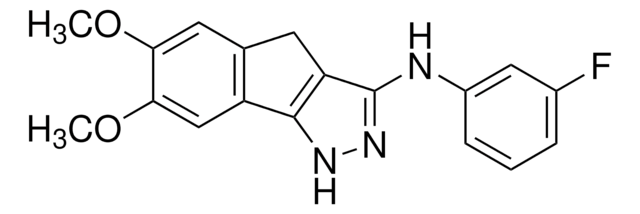SML1555
MS023 hydrochloride
≥98% (HPLC)
Synonym(s):
N1-((4-(4-Isopropoxyphenyl)-1H-pyrrol-3-yl)methyl)-N1-methylethane-1,2-diamine hydrochloride, N1-Methyl-N1-[[4-[4-(1-methylethoxy)phenyl]-1H-pyrrol-3-yl]methyl]-1,2-ethanediamine hydrochloride
About This Item
Recommended Products
Quality Level
Assay
≥98% (HPLC)
form
powder
storage condition
desiccated
color
white to light brown
solubility
H2O: 20 mg/mL, clear
storage temp.
−20°C
SMILES string
CN(CCN)CC1=CNC=C1C2=CC=C(OC(C)C)C=C2.[H]Cl
InChI
1S/C17H25N3O.ClH/c1-13(2)21-16-6-4-14(5-7-16)17-11-19-10-15(17)12-20(3)9-8-18;/h4-7,10-11,13,19H,8-9,12,18H2,1-3H3;1H
InChI key
IEZPALXFXHDDHI-UHFFFAOYSA-N
Related Categories
Biochem/physiol Actions
To learn about other SGC chemical probes for epigenetic targets, visit sigma.com/sgc
Features and Benefits
Other Notes
Storage Class Code
11 - Combustible Solids
WGK
WGK 3
Flash Point(F)
Not applicable
Flash Point(C)
Not applicable
Certificates of Analysis (COA)
Search for Certificates of Analysis (COA) by entering the products Lot/Batch Number. Lot and Batch Numbers can be found on a product’s label following the words ‘Lot’ or ‘Batch’.
Already Own This Product?
Find documentation for the products that you have recently purchased in the Document Library.
Customers Also Viewed
Articles
We offer a variety of small molecule research tools, such as transcription factor modulators, inhibitors of chromatin modifying enzymes, and agonists/antagonists for target identification and validation in gene regulation research; a selection of these research tools is shown below.
We offer a variety of small molecule research tools, such as transcription factor modulators, inhibitors of chromatin modifying enzymes, and agonists/antagonists for target identification and validation in gene regulation research; a selection of these research tools is shown below.
We offer a variety of small molecule research tools, such as transcription factor modulators, inhibitors of chromatin modifying enzymes, and agonists/antagonists for target identification and validation in gene regulation research; a selection of these research tools is shown below.
We offer a variety of small molecule research tools, such as transcription factor modulators, inhibitors of chromatin modifying enzymes, and agonists/antagonists for target identification and validation in gene regulation research; a selection of these research tools is shown below.
Our team of scientists has experience in all areas of research including Life Science, Material Science, Chemical Synthesis, Chromatography, Analytical and many others.
Contact Technical Service








